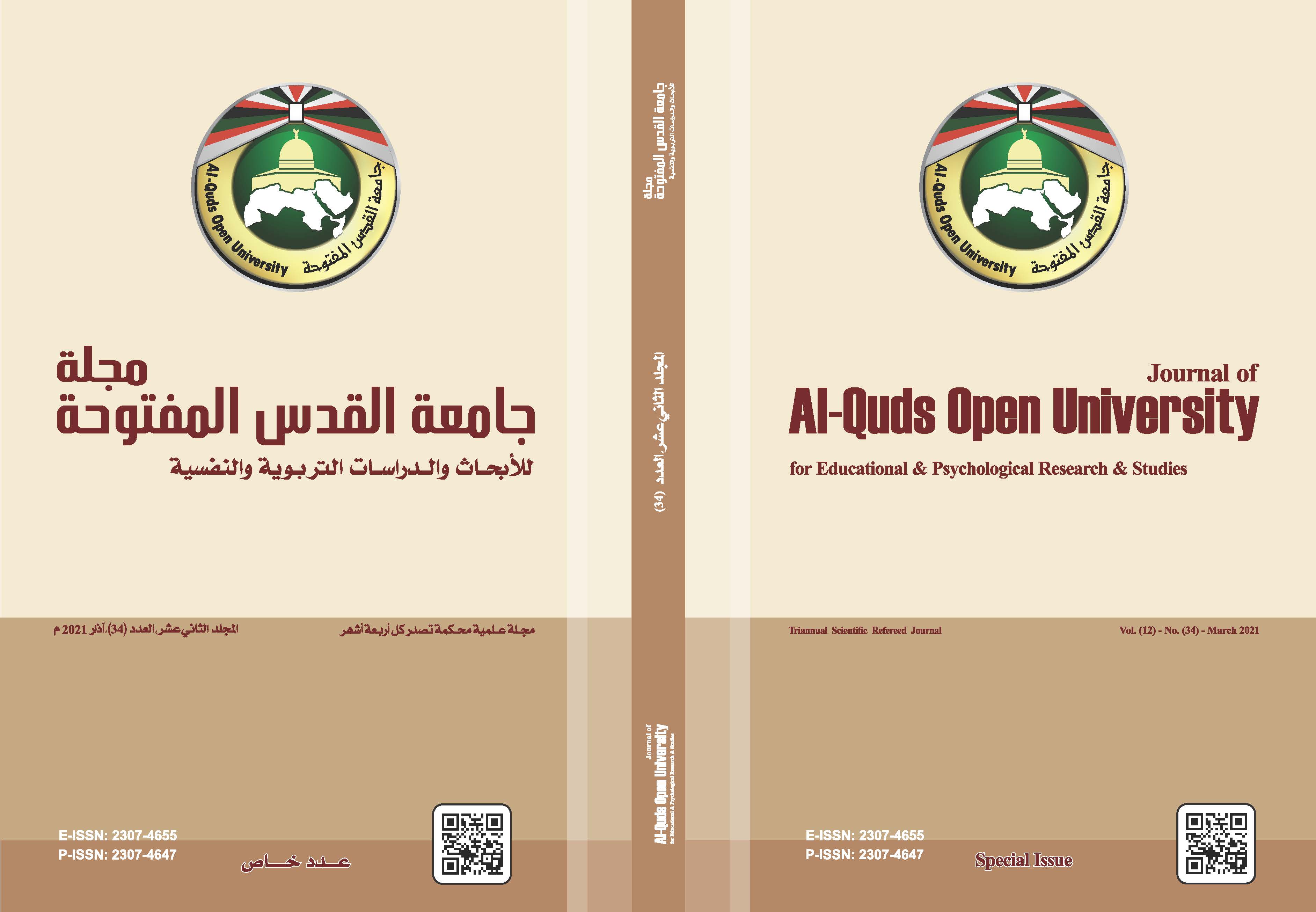The Effect of False Memory and Modality in Problem Solving Based on Insight Among Tenth Grade Female Students
DOI:
https://doi.org/10.33977/1182-012-034-010Keywords:
False Memory, Modality, Problem Solving based on Insight.Abstract
The study aimed at investigating the effect of false memory and modality in problem solving based on insight. The sample of this study consisted of 80 students of the tenth-grade females from Mafraq, Jordan, who were divided into two groups (audio/visual). To achieve the study aims, the Deese-Roediger McDermott Lists were used to create a false memory, and the Compound Remote Associate Task was used to measure problem-solving based on insight. The results revealed that there is a statistically significant difference at α≤.05 between the arithmetic mean for problem-solving based on insight due to false memory, The results showed that there was no statistically significant difference at α≤.05 between the arithmetic mean for problem-solving based on insight due to both: Modality (audio/visual) and memory (real/false). The results showed that there was a statistically significant difference at α≤.05 between means for the speed of problem-solving based on insight due to false memory. The results did not show a statistically significant difference at α≤.05 between mean of the response time for the speed of problem-solving based on insight due to modality (audio/visual) with memory (real/false).
References
أولاً: المصادر والمراجع العربية
- أبو جادو، صالح ونوفل، محمد. (2010). تعليم التفكير: النظرية والتطبيق. عمان: دار المسيرة للنشر والتوزيع.
- أندرسون، ج. (2007). علم النفس المعرفي، (سليط والجمال، مترجم). عمان: دار الفكر (2005).
- سعايدة، ناجي. (2016). أساليب التفكير وعلاقتها بأنماط التعلم السائدة لدى الطلبة ذوي صعوبات تعلم الرياضيات في الأردن، مجلة كلية التربية. جامعة الأزهر. 170(1)، 653- 680.
ثانياً: ترجمة المصادر والمراجع العربية إلى اللغة الإنجليزية
- Abu-Gado, S. & Nawfal, M. (2010). Teaching Thinking: Theory and Practice. Amman: Al Masirah publishing and distribution House.
- Anderson, C. (2007). Cognitive Psychology. (Salit & Jamal, Trans). Amman: Dar Al-Fikr. (2005).
- Saidh, N. (2012) Thinking styles and their relationship to the prevailing Learning Disabilities in Jordan, Journal of the College of Education, AL-Azhar University. 170(1), 653-680.
ثالثاً: المصادر والمراجع الأجنبية
- Bowden, E. & Jung-Beeman, M. (2003).Normative data for 144 compound remote associate problems. Behavior Research Methods, Instruments, & Computers, 35(4), 634-639.
- Buskirk, C. (2007).Effects of modality: Examining the influence of auditory and visual formats on false recognition. Journal of Undergraduate Psychological Research, 2(1), 50-53.
- Davidson, J. & Sternberg, R. (2003).The Psychology of Problem Solving, New York: Cambridge University press.
- Garner, S. & Howe, M. (2014). False memories from survival processing make better primes for problem solving. Memory, 22(1), 9-18.
- Howe, M. & Garner, S. (2018) Can false memories prime alternative solutions to ambiguous problems? Memory, 26(1) 96-105.
- Howe, M., Garner, S., Charlesworth, M. & Knott, L. (2010). A brighter side to memory illusions: False memories prime children's and adults' insight-based problem solving. Journal of Experimental Child Psychology, 108(2). 383-393.
- Hunt, K. & Chittka, L. (2014). False memory susceptibility is correlated with categorization ability in humans. F1000Research, http://dx.doi.org/10.5256/-f1000research.4645.d31516
- Matlin, M. (2009). Cognition-7th ed. New York: Wiley.
- Pezdek, P. & Lam, S. (2007). What research paradigms have cognitive psychologists used to study false memory and what are the implications of these choices. Consciousness and Cognition, 16(1), 2-17.
- Pierce, B., Gallo, D. & Wess, J. (2005). The modality effect in false recognition: Evidence for test-based monitoring. Memory & Cognition. 33 (8), 1407-1413.
- Roediger, H. & Mcdormott, K. (1995). Creating false memories: Remembering words not presented in lists. Journal of Experimental Psychology, 21, 801-814
- Smith, R. & Engle, R. (2011). Study modality and false recall: The influence of resource availability. Exp Psychl. 58(2): 117–124.
- Wang, J., Otgaar, H., Howe, M., Smeets, T., Merckelbach, H. & Nahouli, Z. (2017). Undermining belief in false memories leads to less efficient problem solving behavior. Memory, 25(7), 910-921.
- Zhu, B., Chen, C., Shao, X., Liu, W., Ye, Z., Zhuang, L., Zheng, L., Loftus, E. & Xue, G. (2019). Multiple interactive memory representations underlie the induction of false memory. PNAS. 116(9).3466- 3475.
Downloads
Published
How to Cite
Issue
Section
License
- The editorial board confirms its commitment to the intellectual property rights
- Researchers also have to commit to the intellectual property rights.
- The research copyrights and publication are owned by the Journal once the researcher is notified about the approval of the paper. The scientific materials published or approved for publishing in the Journal should not be republished unless a written acknowledgment is obtained by the Deanship of Scientific Research.
- Research papers should not be published or republished unless a written acknowledgement is obtained from the Deanship of Scientific Research.
- The researcher has the right to accredit the research to himself, and to place his name on all the copies, editions and volumes published.
- The author has the right to request the accreditation of the published papers to himself.







2.png)






_2.png)

